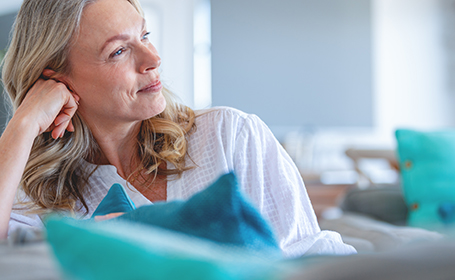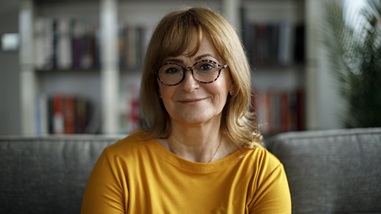
How to take care of yourself during the menopause
Going through the menopause can affect the way you feel both mentally and physically. Consultant Gynaecologist Ms Sucheta Iyengar from The Chiltern Hospital shares her advice on symptoms, self-care and treatments to help you have a healthy menopause
The menopause is when your body starts to produce less oestrogen. Eventually it will mean that your periods stop and that you are no longer able to fall pregnant naturally.
For many women, this drop in oestrogen can lead to symptoms that can be at best disruptive and at worst very distressing. It is common for these symptoms to affect your quality of life, impacting both physical and mental health.
If you do struggle with your symptoms, there are various lifestyle changes and treatments that might help you. Your body is going through a change and it’s important to take care of yourself and stay healthy.
How long menopausal symptoms may last cannot be predicted. One in 10 women may still have symptoms 10 years after their last period.

What are the symptoms of the menopause?
Most women will experience menopausal symptoms. The most common include:
- Hot flushes
- Night sweats
- Sleep disturbance
- Joint pains and aches
- 'Brain fog'
- Mood swings
- Vaginal dryness
- Discomfort during sex
- Lack of energy
- Lower libido
- Changes in skin elasticity or thickness
Of these symptoms, hot flushes are the most common, experienced by three in four women.
Other symptoms include a reduction in the strength and density of your bones, which can increase your chance of developing osteoporosis. There is also some evidence that women are more vulnerable to heart disease and stroke after the menopause.
When will it start to get better?
How long menopausal symptoms may last cannot be predicted. One in 10 women may still have symptoms 10 years after their last period.
How do I take care of myself during the menopause?
For many women, this is a challenging time in their lives even without the menopause. Perhaps they are dealing with hormonal children, caring for elderly relatives, reaching a critical point in their career or all of the above. This can leave little time and energy to look after yourself.
However, during the menopause, self-care is hugely important. This is a time for women to focus on their health and happiness.
Certain lifestyle factors can affect how you feel during the menopause. My top tips are:
1. Eat a diet low in salt and saturated fat
This reduces the risk of cardiovascular disease.
2. Make sure you get enough vitamin D and calcium
Getting enough of these nutrients helps to protect you from osteoporosis.
3. Exercise regularly
This is one of the best tips for anyone looking to maintain their physical health, and is particularly helpful for increasing bone strength. It will also look after your mental health and can reduce anxiety.
Weight-bearing exercises such as walking, running and team sports are particularly effective.
4. Reduce your alcohol intake
Drinking in moderation should benefit your health overall. Don’t exceed the government recommended 14 units a week.
5. Stop smoking
Smoking triggers hot flushes and also increases your risk for cardiovascular disease and osteoporosis.
6. Look after your skin
Oestrogen deficiency during and after menopause can cause noticeable changes in your skin, often causing it to become drier, thinner or less elastic. Use skincare designed for menopausal and post-menopausal women, and consider speaking with a dermatologist.
7. Go to your health screening
The NHS offers health screenings for women and it’s vital that you attend if you want to look after your health during the menopause. Your body is changing and these screenings test for some of the most common issues that arise during this time.

What is the right information about HRT?
There are various treatments available for menopause symptoms, with one of the most well-known being hormone replacement therapy (HRT).
Hormone replacement therapy does what it says on the tin. The medication replaces the hormones that are produced by your ovaries. It is lack of oestrogen that causes symptoms of the menopause, so by replacing these and improving your hormone levels, HRT improves symptoms in many women.
In women who have a uterus, oestrogen alone can cause a thickening of the lining of the womb. This can become abnormal over time.
Because of this, these women also need to take progesterone, another hormone produced by the ovaries. This ensures that the lining of the womb does not thicken. Women who have had a hysterectomy do not need progesterone.
HRT is the most effective form of medication to help with the symptoms of the menopause. It both reduces symptoms in the short term and protects your health in the long term. It helps to prevent cardiovascular disease and osteoporosis, and may protect against dementia.
HRT also helps maintain your sex drive and can reduce vaginal dryness.
HRT is not recommended for women with certain medical conditions, so speak to your doctor to see if it can work for you.
Therapies such as aromatherapy, reflexology, acupuncture, yoga and cognitive behavioural therapy can help alleviate symptoms.
Are there other treatments available?
Therapies such as aromatherapy, reflexology, acupuncture, yoga and cognitive behavioural therapy can help alleviate symptoms such as hot flushes and night sweats. They can also help women deal with anxiety.
Various non-hormonal herbal preparations are available on the market; the commonly used ingredients include soy, black cohosh and red clover. It's not proven that these work, but some women do find that they help. Though you should always speak to your doctor to make sure they are safe for you personally.
Non-hormonal medication
Some women may wish to take medication, but not hormones. Some anti-depressants in small doses can help with management of symptoms such as hot flushes or night sweats. Some may help with sleeping, others may help manage anxiety.
Seeking help with the menopause
One of the most important things you can do to look after yourself during menopause is to get the help you need. GPs are equipped to deal with many aspects of the menopause, but if you’re really struggling, you shouldn’t hesitate to ask for a referral to a specialist. There is no one-size-fits-all treatment, but with the help of a specialist, most women are able to manage their symptoms and feel more like themselves again.

Tags
How do I book an appointment?
If you're concerned about symptoms you're experiencing or require further information on this subject, talk to a GP or see an expert consultant at your local Circle Hospital.